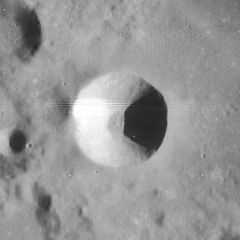Hill (crater)
|
Lunar Orbiter 4 image | |
| Coordinates | 20°54′N 40°48′E / 20.9°N 40.8°ECoordinates: 20°54′N 40°48′E / 20.9°N 40.8°E |
|---|---|
| Diameter | 16 km |
| Depth | 3.3 km |
| Colongitude | 320° at sunrise |
| Eponym | George W. Hill |

Hill is a small lunar impact crater that is located to the west of the prominent crater Macrobius, near the eastern edge of the Sinus Amoris. This crater was previously designated Macrobius B before being given a name by the IAU. It lies just to the north-northeast of Carmichael, another renamed satellite crater of Macrobius.
This is a circular, bowl-shaped crater with an inner wall that has a relatively high albedo compared to the surrounding terrain. The inner walls are symmetrical in form, and slope gently down to the small floor at the midpoint, a surface about one-fourth the diameter of the crater. This formation is not significantly eroded, and is otherwise indistinguishable from many similar craters on the Moon.
References
- Andersson, L. E.; Whitaker, E. A. (1982). NASA Catalogue of Lunar Nomenclature. NASA RP-1097.
- Blue, Jennifer (July 25, 2007). "Gazetteer of Planetary Nomenclature". USGS. Retrieved 2007-08-05.
- Bussey, B.; Spudis, P. (2004). The Clementine Atlas of the Moon. New York: Cambridge University Press. ISBN 978-0-521-81528-4.
- Cocks, Elijah E.; Cocks, Josiah C. (1995). Who's Who on the Moon: A Biographical Dictionary of Lunar Nomenclature. Tudor Publishers. ISBN 978-0-936389-27-1.
- McDowell, Jonathan (July 15, 2007). "Lunar Nomenclature". Jonathan's Space Report. Retrieved 2007-10-24.
- Menzel, D. H.; Minnaert, M.; Levin, B.; Dollfus, A.; Bell, B. (1971). "Report on Lunar Nomenclature by the Working Group of Commission 17 of the IAU". Space Science Reviews 12 (2): 136–186. Bibcode:1971SSRv...12..136M. doi:10.1007/BF00171763.
- Moore, Patrick (2001). On the Moon. Sterling Publishing Co. ISBN 978-0-304-35469-6.
- Price, Fred W. (1988). The Moon Observer's Handbook. Cambridge University Press. ISBN 978-0-521-33500-3.
- Rükl, Antonín (1990). Atlas of the Moon. Kalmbach Books. ISBN 978-0-913135-17-4.
- Webb, Rev. T. W. (1962). Celestial Objects for Common Telescopes (6th revised ed.). Dover. ISBN 978-0-486-20917-3.
- Whitaker, Ewen A. (1999). Mapping and Naming the Moon. Cambridge University Press. ISBN 978-0-521-62248-6.
- Wlasuk, Peter T. (2000). Observing the Moon. Springer. ISBN 978-1-85233-193-1.
